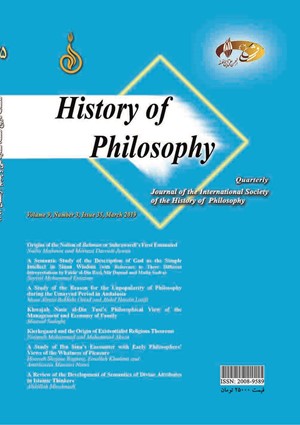Kierkegaard and the Origin of Existentialist Religious Theorems
Subject Areas : Geneology of philosophical schools and IdeasFatemeh Mohammad 1 , Mohammad Akvan 2 *
1 -
2 - Islamic Azad University
Keywords: religious theorems Kierkegaard Leap pathos existentialism ,
Abstract :
The present paper explains the view of Kierkegaard, the prominent founding philosopher of existentialism, regarding religious teachings. Kierkegaard refers to three aesthetic, ethical, and religious spheres for human beings and maintains that there is a large distance between the aesthetic and religious stages. Accordingly, in order to explain the process of development in these spheres, he uses such words as “pathos” and “leap of faith”. Kierkegaard’s discontinuous dialectics, when moving from one stage to the other, reveals that, firstly, these three-fold spheres can never unite with each other even if they co-exist for some time. Finally, there comes a time when, inevitably, one has to be chosen. Secondly, the quality of moving from one stage to the other is not logical and cannot be explained within a specific framework. When confronting the problem of religious faith, Kierkegaard does not allocate any place to the intellect and thought. In other words, he does not specify a certain time, place, and method so that individuals know when, where, and how they can reach the next stage. Rather, he believes that one must take risks in this process, do miracles, and follow the way without resorting to the intellect. Such risks cause a leap from the ethical sphere to the religious sphere, which is the highest level of an original life or existence; a leap which does not fit the framework of rational principles and, hence, cannot be perceived. Kierkegaard dedicates all his efforts in his works to demonstrating that the two spheres of religious belief and intellect are not only different but also in contrast to each other and, thus, one cannot evaluate religious concepts against the criterion of the intellect.
آدامز، رابرت مري هيو، «ادلة کييرکگور بر ضد استدلال آفاقي در دين»، ترجمة مصطفي ملکيان، مجلة نقد و نظر، س1، ش3 و 4، تابستان و پاييز 1374.
اسکروتن، راجر، تاريخ مختصر فلسفة جديد، ترجمة اسماعيل سعادتي خمسه، تهران، انتشارات حکمت،1382.
اندرسن، سوزان لي، فلسفه کييرکگور، ترجمه خشايار ديهيمي، تهران، انتشارات طرح نو، 1385.
بابايي، پرويز، مکتبهاي فلسفي از دوران باستان تا امروز، تهران، انتشارات نگاه، 1386.
پاپکين، ريچارد؛ السترول، آوروم، متافيزيک و فلسفه معاصر، ترجمه سيدجلالالدين مجتبوي، 1387.
پترسون، مايکل و ديگران، عقل و اعتقاد ديني، ترجمه احمد نراقي و ابراهيم سلطاني،تهران، نشر طرح نو، 1377.
پروتي، جيمز.ال، الوهيت و هايدگر، ترجمه محمدرضا جوزي، تهران، انتشارات حکمت، چ1، 1388.
پروتي، جيمز.ال، پرسش از خدا در تفكر هايدگر؛ ترجمه محمدرضا جوزي، تهران، ساقي، 1389.
توکلي، غلامحسين، «كييركگور و ارده¬گروي»، مجله نامه مفيد، س7، ش28، زمستان1380.
خاتمي، محمود، جهان در انديشه هايدگر، مؤسسه فرهنگي دانش و انديشه معاصر، 1389.
کاپلستون، فردريک، تاريخ فلسفه، ترجمة داريوش آشوري، تهران، انتشارات علمي و فرهنگي، ج7، چ4، 1387.
ﻛﻲﻳﺮکگور، ﺳـﻮﺭﻥ، ﺑﻴﻤﺎﺭﻱ ﺑﻪ ﺳﻮﻱ ﻣﺮگ، ترجمه ﺭؤﻳـﺎ ﻣـﻨﺠﻢ، اصفهان، انتشارات پرسش، چ2، 1378.
ﻛﻲﻳﺮکگور، ﺳـﻮﺭﻥ، «ﮔﺰﻳﺪﻩﺍﻱ ﺍﺯ ﻳﺎﺩﺩﺍﺷـﺘﻬﺎﻱ ﻭﺍﭘﺴـﻴﻦ ﺳـﺎﻟﻬﺎ»، ترجمه ﻓﻀﻞ ﺍﷲ ﭘﺎﻛﺰﺍﺩ، ﻓﺼﻠﻨﺎﻣﻪ ﺍﺭﻏﻨﻮﻥ، ش5 و 6، 1383.
ﻛﻲﻳﺮکگور، ﺳـﻮﺭﻥ، «انفسيبودن حقيقت است»، ترجمة مصطفي ملکيان، مجلة نقد و نظر، س1، ش3 و 4، تابستان و پاييز1374.
ﻛﻲﻳﺮکگور، ﺳـﻮﺭﻥ، ترس و لرز، ترجمة عبدالکريم رشيديان، تهران، نشر ني، 1387.
فعالي، محمدتقي، ايمان ديني در اسلام و مسيحيت، تهران، انديشه جوان، چ1، 1378.
مستعان، مهتاب، کييرکگور؛ متفکر عارفپيشه، تهران، نشر ولايت، 1374.
مک کواري، جان، فلسفة وجودي، ترجمة محمدسعيد حنايي کاشاني، تهران، انتشارات هرمس، 1377.
ميثمي، سايه «کييرکگور و حقيقت ايمان»، سروش انديشه، ش 2، 1385.
نصري، عبدالله، خدا و انسان در فلسفة ياسپرس، تهران، دفتر نشر فرهنگ اسلامي،1383.
نصري، عبدالله، سيماي انسان کامل از ديدگاه مکاتب، تهران، انتشارات دانشگاه علامه طباطبايي، 1376.
نقيبزاده، ميرعبدالحسين، نگرشي به فلسفه¬هاي سده بيستم، تهران، انتشارات طهوري، 1387.
همداني، اميد، عرفان و تفكر، از تأملات عرفاني مولوي تا عناصر عرفاني در طريق تفكر هايدگر، تهران، نگاه معاصر، 1387.
هوردرن، ويليام، راهنماي الهيات پروتستان، طاطهووس ميکائيليان، تهران، انتشارات علمي و فرهنگي، چ1، 1368.
وال، ژان، انديشة هستي، ترجمة باقر پرهام، تهران، کتابخانة طهوري، 1357.
وال، ژان، بحث در مابعدالطبيعه، ترجمة يحيي مهدوي و همکاران، تهران، انتشارات خوارزمي، 1380.
وال، ژان، ورنو، روژه، نگاهي به ﭘﺪﻳﺪﺍﺭﺷﻨﺎﺳﻲ ﻭ ﻓﻠﺴﻔﻪﻫـﺎﻱ ﻫﺴـﺖبودن، ترجمه يحيي مهدوي، تهران، خوارزمي، چ1، 1372.
Evans, C. Stephen, Kierkegaard’s Fragments and Postscript, Humanities Press International Inc.,1983.
Ferreira, Jamie, The Cambridge Companion to Kierkegaard, edited by Alstair Hannay and Cordon D. Marina, Cambridge University Press, 1998.
Kierkegaard, Soren, Concluding Unscientific Postscript, ed. and trans by Howard V. Hong and Edna Hong, Princeton University Press, 1992.
Kierkegaard, Soren, Fear and Trembling and Repetition, ed. and trans. Howard V. Hong and Edna Hong, Princeton University Press,1983.
Kierkegaard, Soren, Fear and Trembling, Cambridge University Press, 2006.
Kierkegaard, Soren, Training in Christianity, Walter Lowrie, London and New York, Oxford University Press, 1941.
Kierkegaard, Soren, EITHER/OR, ed. and trans. Howard V. Hong and Edna Hong, 1987.

